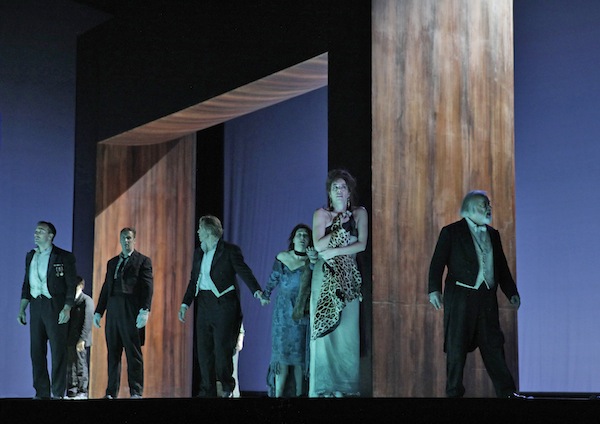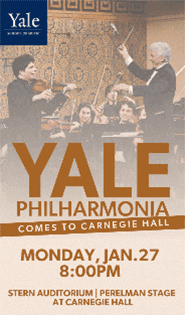Adès’ “Exterminating Angel” proves spellbinding in Met’s American premiere

At the Metropolitan Opera, the memorable performances usually happen with great renditions of the standards: a soprano who rivets as Tosca, or a or a sumptuous orchestral reading of the Ring.
A bracing premiere of a contemporary work isn’t the company’s specialty, but on Thursday night just such an occasion made for the highlight of the fall season thus far. Thomas Adès’ second premiere at the Met showed once again that he is undoubtedly one of the foremost composers of our time.
Luis Buñuel’s 1962 film The Exterminating Angel has long had a following of its own, as a cinema classic and a touchstone of the surrealist movement. A story of a high-society dinner that no one can ever leave—and whose attendees become more and more savage in their interactions as the ordeal continues—it is at once a Marxist critique of aristocratic values as well as the most exquisite nightmare of the socially anxious.
In its operatic form, The Exterminating Angel is an intense experience. The libretto by Tom Cairns hews closely to its source, following the original almost to the letter. As a party of dinner guests arrive—twice—at the home of Edmundo and Lucía de Nobile, the household staff hurry to leave, offering meager excuses for their absence. As the fête drags on late into the night and through to the next day, the company realize that they are under some sort of spell that prevents them from leaving.
The staging, also by Cairns, is a vivid creation, using stark visuals to make the scene come alive while retaining Buñuel’s impeccable sense of the bizarre. The stage turntable is deftly employed to present the grim scene in the parlor in tandem with the agitation of the curious mob outside. The brilliance of Hildegard Bechtler’s costuming becomes most apparent in the closing tableau, where the splashy colors of the crowd’s chic ‘60s clothes are pitted against the faded grandeur of the dinner guests’ once-opulent evening attire.
What makes Buñuel’s scenario so fascinating is precisely the fact that, as far as any viewer can tell, there is no “forcefield” preventing the dinner guests from leaving. The effect of the barrier, such as it is, is psychological rather than physical: the guests are trapped in the room not because they are thrown back by some unseen force, but because, as they approach the doorway, they realize there is one more coffee spoon that needs to be picked up, one more goodbye to be said. In that regard the only directorial choice that rings hollow is an attempted exit by Julio, the butler, who strides purposefully toward the dining room and then jumps back, as though zapped by an electric current.
There are no real leads as such, but the current run at the Met brings together a superb ensemble cast.
In Thursday’s night’s American premiere, Joseph Kaiser was the picture of a gracious host, his tenor bright and clean as Edmundo de Nobile. Amanda Echalaz was a glamorous presence, with a blooming, liquid soprano as his wife Lucía. Audrey Luna, now a regular in Adès operas, blazed high above the staff as the opera diva Leticia Maynar. Sally Matthews was deliciously obnoxious as the self-absorbed Silvia de Ávila, singing with piercing brightness, and countertenor Iestyn Davies’s countertenor was clear and pealing as ever, finding a bit of slime in his characterization of her incestuous brother, Francisco.
David Adam Moore showed a robust, brassy baritone as the hot-headed Colonel G’omez, while Christian Van Horn maintained a quiet dignity as Julio. Kevin Burdette’s appearance as the elderly Señor Russell was brief but chilling, as he groaned out a dark premonition in his final moments. The preening of Rod Gilfry as Maestro Alberto Roc offered tart moments of comedy as the scene spiraled into chaos. As Raúl, Frédéric Antoun brought a warm, beaming tenor that in another opera could serve for a romantic lead.
If the piece has any kind of moral center, it’s Doctor Conde, ever the voice of reason shouting against the natural slide towards barbarism—here played by John Tomlinson, an admirable, imposing bass who could often take on a more buffo feel.
Even with so strong a cast, the real stars are Adès and the brilliant score that he led from the pit. Much of his music finds novel ways to put the listener on edge: recurring throughout the piece is a quasi-motivic Viennese waltz, resurfacing at the most bizarre moment possible, and always slightly twisted, so as to create acute unease through the distortion of a familiar form.
Adès finds opportunities to show off his gift for lyric writing, as well: towards the end of Act II, as things really unravel, Blanca (Christine Rice, full-voiced and self-assured) sits at the piano and sings a haunting melody, starting mournfully, and growing more maddened as it goes along until eventually she pounds away at a single dissonant chord. When the soon-to-be spouses Beatrìz (a rich-voiced Sophie Bevan) and Eduardo (the shining tenor David Portillo) decide to end their torment apart from the rest of the company, they sing a sumptuous duet in their fatal embrace.
Some of the most striking music of all comes in a set-piece aria for Leonora, a middle-aged patient of Dr. Conde with a terminal diagnosis. Reproducing a scene from the film in which she hallucinates Russell’s severed hand coming out of the closet, Adès imagines a poetic song for voice and guitar, with the hand dancing across the doorframe as though plucking out the accompaniment. Alice Coote was marvelous as Leonora; her usual richness of tone and deep connection to music and text made for a truly trance-like experience.
But The Exterminating Angel is in many ways more a theatrical piece than a musical one, and the genius in Adès’ work is his ability to find an ingenious musical solution to every dramatic need.
His imagination begins even before the downbeat: rather than the customary eight-minute bell, an eerie chime summons the audience into the theater, growing ever more insistent as the curtain-time approaches. As the guests sleep between Acts I and II, a blaring, percussive military march accompanies a Rothko-like apparition, a pale wash of green that moves across the front curtain. As the guests begin to understand their predicament, those who truly grasp the situation are only able to express their fears at an excruciatingly slow pace, accompanied by the eerie wailing of an ondes martenot.
Seldom has a dramatic work come to more vivid life in its musical realization. Adès’ latest is a masterpiece in every sense; with two stirring successes under his belt, he’s established an impressive track record of presenting major new works at the Met, albeit after previous showings elsewhere. Sooner or later, the company ought to take a real chance and offer an Adès world premiere.
The Exterminating Angel runs through November 21 at the Metropolitan Opera. metopera.org


Posted Oct 30, 2017 at 4:27 pm by francois Lamarche
I have read how this is supposed to be AvantGarde, surrealistic, etc… etc… but if you are not a Opera theoretician, it just is a waste of very good voices to an incomprehensible, not very harmonious mess… Sorry… Don’t waste on tickets like I did…
Posted Nov 14, 2017 at 7:53 am by Mary Macherini
Fortunately, we were given a pair of tickets, so we suffered for free. Another example of ” The Emperor has no clothes”. When someone in an opera dies and you do not care a whit, at the least it is an operatic failure. When less than 5% of the diction is comprehensible, the composer needs to learn how to write for the voice. We enjoyed the costumes and thought the sheep amusing. A wasteland artisticalky otherwise.
Posted Nov 18, 2017 at 4:54 pm by Robert Kilzer
I just came from the Met HD performance. The NYTimes said this was the opera you must see this season. But the two comments above are far, far more accurate. This is a waste of time, money and most of all talent. The opera is in English, but never have I needed subtitles more…in English. The orchestra is, as usual, magnificent. The pawnshop of strange instruments interesting. But there’s not a melody line in the entire production. Musical pyrotechnics galore. Great sets, costumes and stage direction. But opera is first and foremost about great music and a story that moves the soul. I feel asleep in the third act. Admittedly, that could say more about me than this opera. So I shall leave you to your own conclusions.
Posted Nov 19, 2017 at 12:20 pm by keith haines
Its Opera but not as we know it. But thats what surrealism was all about too. Its not easy on the ear but its impressive to create this piece in and of music. The performances were fantastic, real acting is required. It is very well done and well worth the effort.
Posted Nov 21, 2017 at 7:53 pm by John Logan
I believe the previous commentators to be wrong. TEA is a masterpiece lacking only in the final scene in the film which is set in the cathedral in the unnamed city for a Te Deum (ceremony of thanksgiving), after which the attendees are unable to exit. With it included all that has gone before is seen to be a metaphor for the power or religious belief.